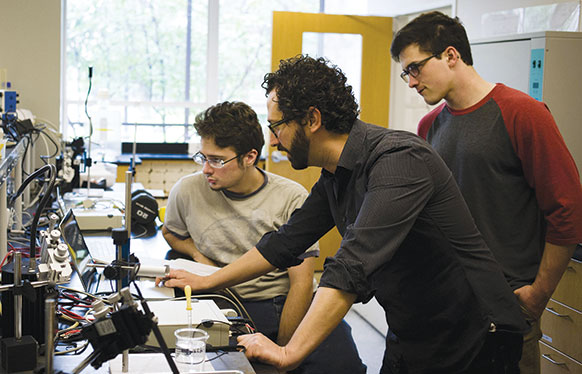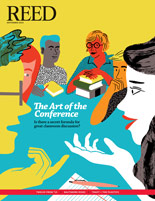
IRIS login | Reed College home Volume 94, No. 3: September 2015
Eliot Circular
Reed Profs Win $2.2 Million in Grants, Set 10-Year Record

From parasitic wasps to the Moroccan diaspora, Reed profs win grants for their work.
By Randall S. Barton
Professors at Reed won a total of $2,251,849 in research grants in fiscal year 2014-15, the highest figure in at least a decade (and possibly longer).
The eleven professors are pursuing a remarkable range of projects from the venom of parasitic wasps, to the compounds of bismuth, to the Moroccan diaspora.
Prof. Suzy Renn [biology 2006-] won a $618,000 grant from the National Science Foundation to investigate a striking example of maternal behavior—voluntary starvation among African cichlid fish. Her research could shed light on the evolution of maternal instincts and deepen our understanding of metabolic and feeding disorders.
Prof. Erik Zornik [biology 2012–] won a $444,000 grant from the National Institutes of Health to research mechanisms in the brain that generate rhythmic behavior, with the goal of finding new treatments for neurological disorders.
Prof. Todd Schlenke [biology 2013-] won a $373,000 grant from the National Institute of Allergy and Infectious Diseases, a division of the National Institutes of Health, to study one of nature’s most unforgiving arms races—the struggle between fruit flies and venomous parasitic wasps. (May the contest be long and bloody.)
Prof. Jay Mellies [biology 1999-] won a $362,769 grant from the National Institutes of Health investigate a key regulatory protein that enables a sinister pathogen to sicken children.
Prof. Marc Schneiberg [sociology 2000-] won a $170,824 grant from the National Science Foundation to investigate how community banks and credit unions helped Americans weather the Great Recession.
Prof. Noelwah Netusil [economics 1990–] won a $99,256 grant from the U.S. Department of Agriculture to investigate how the restoration of Johnson Creek has affected local property values.
Prof. Kristen Anderson [psychology 2007-] won a $73,000 grant from the National Institute of Alcohol Abuse & Alcoholism, a division of the National Institutes of Health, to understand the role gender plays in outcomes from an adolescent alcohol prevention program.
Prof. Rebecca LaLonde ’01 [chemistry 2013-] won a $40,000 grant from the Research Corporation for Scientific Advancement to investigate the heavy metal bismuth as a potential catalyst in the synthesis of medical compounds.
Prof. Paul Silverstein [anthropology 2000-] has won a Fulbright fellowship to trace the Moroccan Berber diaspora in Western Europe.
Prof. Angelica Osorno [math 2013-] has won a Collaboration Grant for Mathematicians for $35,000 from the Simons Foundation to study infinite loop spaces.
Prof. Osorno and Prof. Kyle Ormsby [math 2014-] also won a $28,000 grant from the National Science Foundation for a conference on Equivariant and Motivic Homotopy Theory
Prof. Alan Shane Dillingham [history 2014-] won a $6,000 summer stipend from the National Endowment for the Humanities to continue an historical study of incorporating native peoples into the national political and economic structures of Latin America.
The total for research grants tops the 10-year record, which was set in FY2003–04. Before that, Reed did not keep a running tally of grants received, so it remains unclear if this is an all-time high.

LATEST COMMENTS
steve-jobs-1976 I knew Steve Jobs when he was on the second floor of Quincy. (Fall...
Utnapishtim - 2 weeks ago
Prof. Mason Drukman [political science 1964–70] This is gold, pure gold. God bless, Prof. Drukman.
puredog - 1 month ago
virginia-davis-1965 Such a good friend & compatriot in the day of Satyricon...
czarchasm - 4 months ago
John Peara Baba 1990 John died of a broken heart from losing his mom and then his...
kodachrome - 7 months ago
Carol Sawyer 1962 Who wrote this obit? I'm writing something about Carol Sawyer...
MsLaurie Pepper - 8 months ago
William W. Wissman MAT 1969 ...and THREE sisters. Sabra, the oldest, Mary, the middle, and...
riclf - 10 months ago